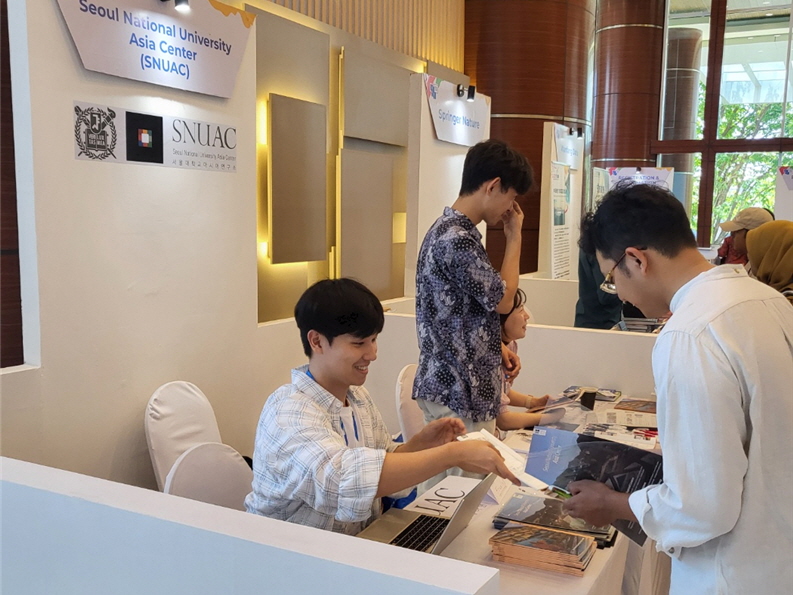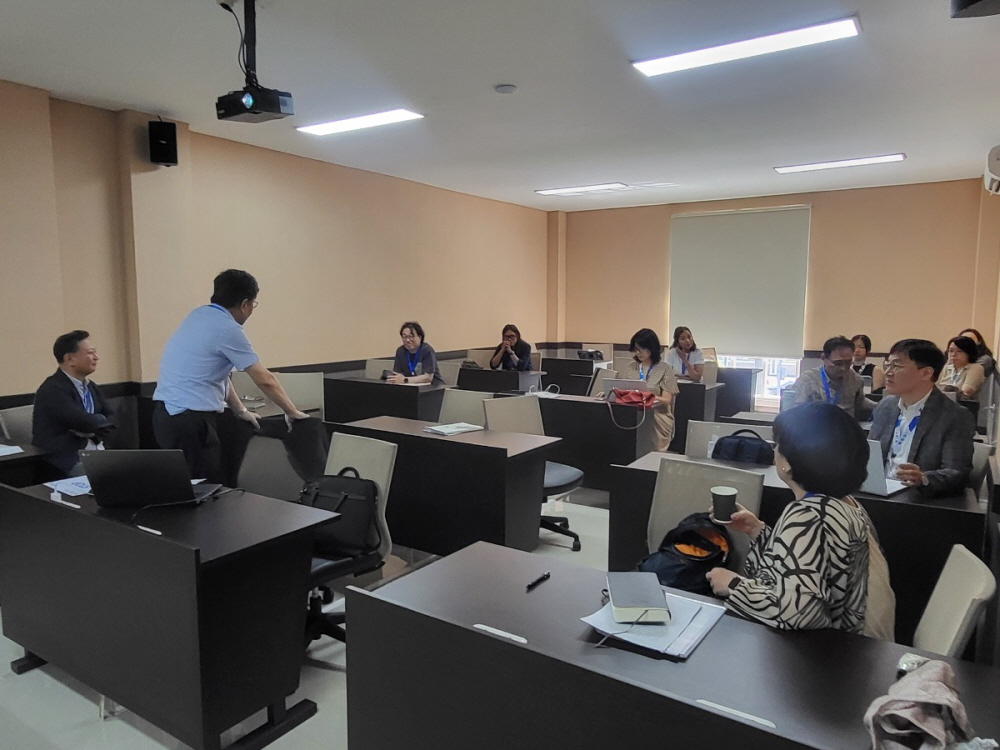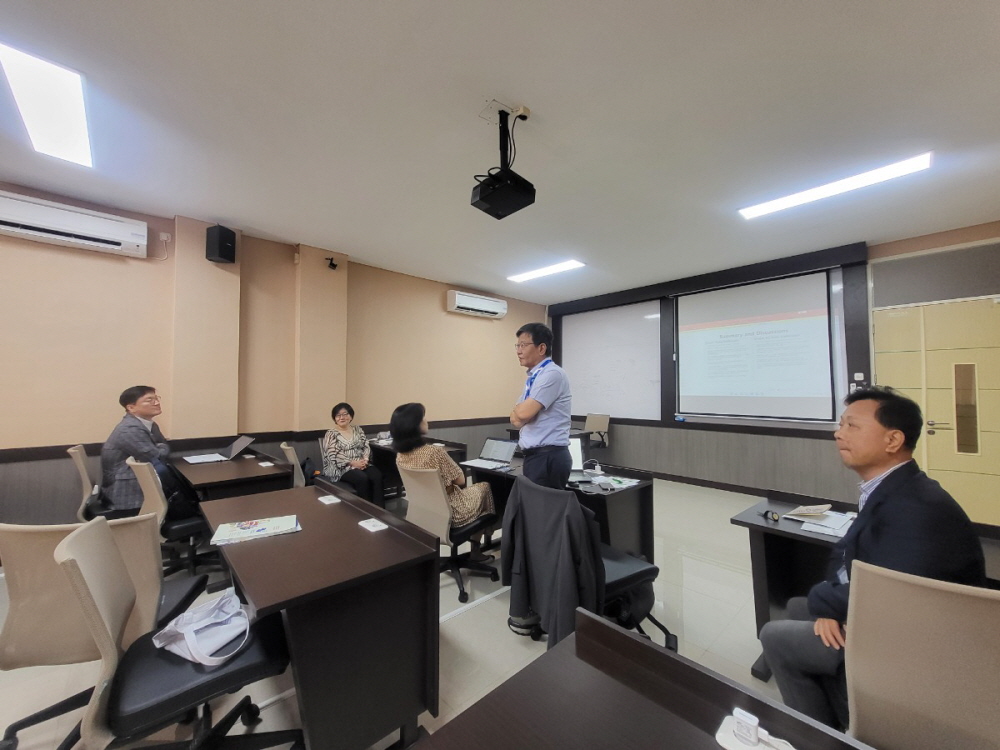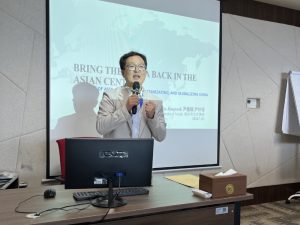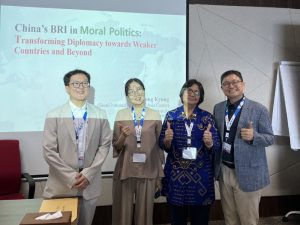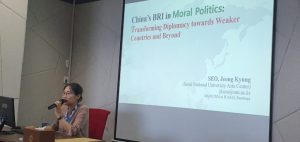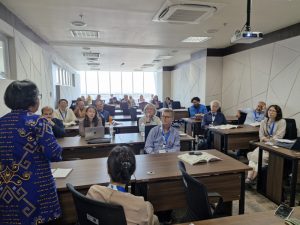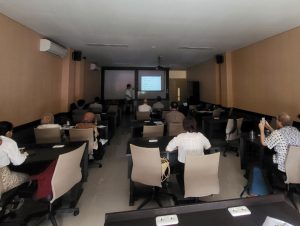[News] SNUAC Participates in “The 13th International Convention of Asian Scholars (ICAS 13)”
From July 28 to August 1 (Sunday to Thursday), “The 13th International Convention of Asian Scholars (ICAS 13)” was held at Universitas Airlangga in Surabaya, Indonesia. Organized every three years by the International Institute for Asian Studies at Leiden University in the Netherlands, a key partner institution of SNUAC, the ICAS conference is a major international academic event in the field of Asian studies. It serves as a platform for communication and sharing of interdisciplinary and integrative research on Asia. SNUAC participated in the conference in various capacities, including organizing sessions, attending forums, and operating a promotional booth.
<HK+ Mega-Asia Research Project Group>
At ICAS 13, the HK+ Mega-Asia Research Project Group sought to disseminate its research agenda internationally through a session titled “Mega-Asia: Establishing Asia Itself as the Unit of Analysis.” Professor Suhong Chae from the Department of Anthropology served as the chair of the session, while participating researchers included Professor Beomshik Shin from the Department of Political Science and International Relations, and HK Professors Ilhong Ko and Jungwon Huh from SNUAC. They presented the outcomes of their agenda research, with Professor Kyung-hoon Lim from the Department of Political Science and International Relations and Research Fellow Jong-Cheol Kim of SNUAC engaging in discussions on the presentations.
In his presentation titled “Emerging Mega-Asia: A New Paradigm for Asian Studies,” Professor Shin introduced the necessity and utility of the ‘Mega-Asia’ concept, proposing it as a new paradigm for Asian regional studies. HK Professor Ko, in collaboration with HK Research Professor Minjae Zoh and others, delivered a presentation entitled “Asia’s World Heritage-scape: Components, Perspectives and Data,” explaining why ‘World Heritage’ is an appropriate research subject for applying a ‘Mega-Asia perspective’ that considers Asia as a single unit of analysis. Lastly, HK Research Professor Jungwon Huh presented “Mapping Value Proximity in Mega-Asia: Family Roles and Gender Expectations among Urban Citizens,” categorizing the values of Asian citizens regarding family and gender based on the analysis of the ‘Asian Metropolitan Value Survey’ conducted by the institute in 2022.
During the discussions and Q&A sessions, participants deliberated on the need for regional typologies in the perception of World Heritage across Asia and the importance of conducting value surveys targeting populations outside major cities. The insights and discussions from the session are expected to play a significant role in deepening the agenda research of the HK+ project group.
One of the goals of the HK+ Mega-Asia Research Project Group is to overcome Western-centric perspectives on Asia by capturing the dynamic changes and interconnectedness occurring simultaneously across the continent through an ‘Asian lens.’ The concept of ‘Mega-Asia’ serves as a framework for regional cooperation encompassing a much broader scope than before, aiming to provide an ideological foundation for peace and prosperity that can collectively address the various changes Asia will experience in the future. The discussions with domestic and international Asian researchers on the usefulness of ‘Mega-Asia’ as a concept and methodology will serve as a foundation for deepening and advancing the second-phase agenda of the Mega-Asia Project Group. It is anticipated that this will provide a theoretical basis for solidarity and cooperation among Asian citizens toward peace and prosperity in Asia and the world.
<Northeast Asia Center>
The Northeast Asia Center (headed by Director Kim Baek-Yung) held a panel on July 30 from 11:15 to 13:00 titled “China’s Belt and Road Initiative and Its Multifaceted Impact on Asia: Through the Eyes of Asia.” This panel provided a platform for both international and domestic scholars, who participated in the Asia-China Dialogue 2022 jointly hosted by the Northeast Asia Center and the Center for the Study of China’s Rise at the University of Seoul last November, to present their final research findings.
Moderated by Research Fellow Suk-Ki Kong, the panel featured four presentations. The first presentation, “Geopolitical Implications of China’s High-speed Railway Projects in ASEAN Countries,” was delivered by Professor Evi Fitriani from Universitas Indonesia. She critically examined China’s high-speed railway projects, a core component of the Belt and Road Initiative (BRI), from the perspective of ASEAN countries. Dr. Umesh Moramudali from the University of Colombo followed with a presentation titled “China’s Financing and Domestic Politics in Sri Lanka – Parallel Evolution across mid-20th vs 21st century episodes of bilateral interactions,” analyzing the debt issues surrounding the Hambantota Port by comparing the 20th and 21st centuries with a focus on domestic politics in Sri Lanka and China’s financial involvement.
In addition, Academic Research Professor Jeong-Kyung Seo from SNUAC presented “China’s BRI in Moral Politics: Transforming Diplomacy towards Weaker Countries and Beyond.” She explored how the Xi Jinping administration integrates the BRI with the discourse on a “Community of Common Destiny for Mankind,” introducing the concept of “moral politics” influenced by Confucianism and applying it to China’s long-term diplomatic shifts towards weaker nations, offering a critical view of the BRI under Xi Jinping. Lastly, Professor Jongseok Yoon from the University of Seoul presented “Bring the ASIA back in the Asian Century,” analyzing anti-China sentiment among East Asian populations and examining how China, in its rise, can position itself within the Asian Century despite mixed perceptions from the international community regarding the BRI.
The panel attracted a large number of scholars, filling the conference room and demonstrating significant interest in the topic. Following the four presentations, the audience engaged in a lively discussion, raising diverse questions related to the multifaceted impacts of high-speed railways in East Asia, survey results on anti-China sentiment among South Korea’s younger generation, and the differences between China’s and the United States’ approaches to aid in developing countries. The dialogue was both robust and insightful. Some of the research findings presented at this panel will be published in a special issue of the Asian Journal of Political Science, an English-language academic journal from SNUAC, scheduled for release in December of this year.
<Center for Asian Urban Societies>
The ICAS 13 event held in Surabaya, Indonesia, was a long-awaited opportunity for researchers to finally satisfy their academic thirst after the disruptions caused by COVID-19. While researchers have continued to analyze past, present, and future scenarios and strive for a deeper understanding in the virtual world, the emotional connection and interaction between audience and presenters that comes from face-to-face discussions are irreplaceable. ICAS 13, therefore, was a precious academic opportunity that met researchers’ needs more than ever before.
Although I couldn’t attend the event due to travel constraints, I found it deeply meaningful that SNUAC was part of the grand opening ceremony that warmly welcomed participants. The variety of session topics and the chance to meet participants from diverse academic backgrounds, which are hard to find at domestic academic events, were particularly exciting. From the first day on July 28 to the last on August 2, the event was filled not only with academic sessions but also with film screenings and various cultural activities between sessions, ensuring there was never a dull moment. Every aspect of the experience was enjoyable, from the registration process on the first day to participating in sessions, exploring the area around Universitas Airlangga, and sharing laughter and conversations with newly met researchers over lunch.
As this was my first visit to Indonesia, everything felt unfamiliar and somewhat awkward. However, the guides, who quietly and diligently assisted throughout the event, helped ease any discomfort without a hint of annoyance. One particularly memorable moment was when I was waiting for a shuttle bus to return to the hotel after a session. The driver had not returned at the scheduled time, which left me feeling uneasy, but a nearby guide informed me that the bus would be delayed by about 20 minutes due to traffic and reassured me by guiding me to the shuttle when it arrived, ensuring I didn’t miss it. I felt a deep sense of gratitude towards the ICAS 13 staff, who managed to maintain their smiles and helpfulness despite the hot weather and constant demands from attendees.
At the Center for Asian Urban Societies, we focused on discussions related to the conceptualization of the “enabling city” and the future of alternative urbanism. We explored issues arising from the international expansion of Korea’s smart city projects, the dynamics and rise of commons related to the Gyeongui Line Commons, and the implications of social housing, finance, and labor as capacity-building infrastructures. Despite the depth of these research topics and the rapid pace of presentations due to time constraints, the audience engaged with serious questions, prompting the presenters to reflect on their work and seek answers to what makes a better city. This experience reinforced the idea that the act of “research” becomes more valuable through the process of sharing problems and pondering them together.
The five-day academic event, filled with passion for research, passed by quickly, but the experience has become a cherished memory and the starting point for new research endeavors. Finally, just as the impression of a place is shaped by its weather and the people you meet, my first impression of Indonesia will be remembered not only for its heat but also for the enduring passion of the scholars and the warm smiles of those who were always ready to lend a helping hand.

